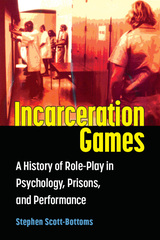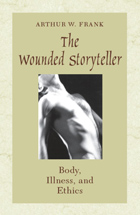
Ill people are more than victims of disease or patients of medicine; they are wounded storytellers. People tell stories to make sense of their suffering; when they turn their diseases into stories, they find healing.
Drawing on the work of authors such as Oliver Sacks, Anatole Broyard, Norman Cousins, and Audre Lorde, as well as from people he met during the years he spent among different illness groups, Frank recounts a stirring collection of illness stories, ranging from the well-known—Gilda Radner's battle with ovarian cancer—to the private testimonials of people with cancer, chronic fatigue syndrome, and disabilties. Their stories are more than accounts of personal suffering: they abound with moral choices and point to a social ethic.
Frank identifies three basic narratives of illness in restitution, chaos, and quest. Restitution narratives anticipate getting well again and give prominence to the technology of cure. In chaos narratives, illness seems to stretch on forever, with no respite or redeeming insights. Quest narratives are about finding that insight as illness is transformed into a means for the ill person to become someone new.

At the edge of mortality there is a place where the seriously ill or dying wait—a place where they may often feel vulnerable or alone. For over forty years, bioethicist cum philosopher Richard Zaner has been at the side of many of those people offering his incalculable gift of listening, and helping to lighten their burdens—not only with his considerable skills, but with his humanity as well.
The narratives Richard Zaner shares in Conversations on the Edge are informed by his depth of knowledge in medicine and bioethics, but are never "clinical." A genuine and caring heart beats underneath his compassionate words. Zaner has written several books in which he tells poignant stories of patients and families he has encountered; there is no question that this is his finest.
In Conversations on the Edge, Zaner reveals an authentic empathy that never borders on the sentimental. Among others, he discusses Tom, a dialysis patient who finally reveals that his inability to work—encouraged by his overprotective mother—is the source of his hostility to treatment; Jim and Sue, young parents who must face the nightmare of letting go of their premature twins, one after the other; Mrs. Oland, whose family refuses to recognize her calm acceptance of her own death; and, in the final chapter, the author's mother, whose slow demise continues to haunt Zaner's professional and personal life.
These stories are filled with pain and joy, loneliness and hope. They are about life and death, about what happens in hospital rooms—and that place at the edge—when we confront mortality. It is the rarest of glimpses into the world of patients, their families, healers, and those who struggle, like Zaner, to understand.
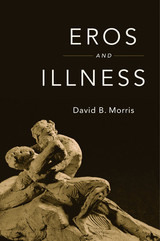
Susan Sontag once described illness as “the night-side of life.” When we or our loved ones fall ill, our world is thrown into darkness and disarray, our routines are interrupted, our deepest beliefs shaken. The modern regime of hyper-logical biomedicine offers little solace when it comes to the effects of ill health on our inner lives. By exploring the role of desire in illness, Eros and Illness offers an alternative: an unconventional, deeply human exploration of what it means to live with, and live through, disease.
When we face down illness, something beyond biomedicine’s extremely valuable advances in treatment and prevention is sorely needed. Desire in its many guises plays a crucial part in illness, David Morris shows. Emotions, dreams, and stories—even romance and eroticism—shape our experiences as patients and as caregivers. Our perception of the world we enter through illness—including too often a world of pain—is shaped by desire.
Writing from his own heartbreaking experience as a caretaker for his wife, Morris relates how desire can worsen or, with care, mitigate the heavy weight of disease. He looks to myths, memoirs, paintings, performances, and narratives to understand how illness is intertwined with the things we value most dearly. Drawing on cultural resources from many centuries and media, Eros and Illness reaches out a hand to guide us through the long night of illness, showing us how to find productive desire where we expected only despair and defeat.
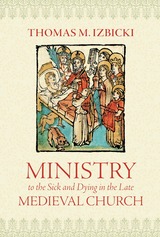
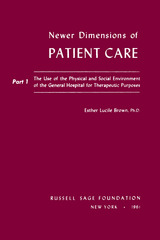

Responding to the recent growth of illness and disability narratives in the United States—such works as Juliet Wittman’s Breast Cancer Journal, John Hockenberry’s Moving Violations, Paul Monette’s Borrowed Time: An AIDS Memoir, and Lou Ann Walker’s A Loss for Words: The Story of Deafness in a Family—Couser addresses questions of both poetics and politics. He examines why and under what circumstances individuals choose to write about illness or disability; what role plot plays in such narratives; how and whether closure is achieved; who assumes the prerogative of narration; which conditions are most often represented; and which literary conventions lend themselves to representing particular conditions. By tracing the development of new subgenres of personal narrative in our time, this book explores how explicit consideration of illness and disability has enriched the repertoire of life writing. In addition, Couser’s discussion of medical discourse joins the current debate about whether the biomedical model is entirely conducive to humane care for ill and disabled people.
With its sympathetic critique of the testimony of those most affected by these conditions, Recovering Bodies contributes to an understanding of the relations among bodily dysfunction, cultural conventions, and identity in contemporary America.
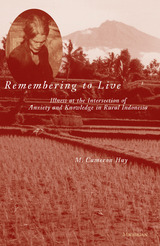

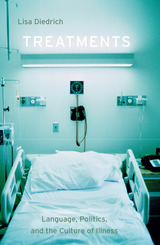
Creative expression inspired by disease has been criticized as a celebration of victimhood, unmediated personal experience, or just simply bad art. Despite debate, however, memoirs written about illness—particularly AIDS or cancer—have proliferated since the late twentieth century and occupy a highly influential place on the cultural landscape today.
In Treatments, Lisa Diedrich considers illness narratives, demonstrating that these texts not only recount and interpret symptoms but also describe illness as an event that reflects wider cultural contexts, including race, gender, class, and sexuality. Diedrich begins this theoretically rigorous analysis by offering examples of midcentury memoirs of tuberculosis. She then looks at Susan Sontag’s Illness As Metaphor, Audre Lorde’s The Cancer Journals, and Eve Kosofsky Sedgwick’s “White Glasses,” showing how these breast cancer survivors draw on feminist health practices of the 1970s and also anticipate the figure that would appear in the wake of the AIDS crisis in the 1980s—the “politicized patient.” She further reveals how narratives written by doctors Abraham Verghese and Rafael Campo about treating people with AIDS can disrupt the doctor–patient hierarchy, and she explores practices of witnessing that emerge in writing by Paul Monette and John Bayley.
Through these records of intensely personal yet universal experience, Diedrich demonstrates how language both captures and fails to capture these “scenes of loss” and how illness narratives affect the literary, medical, and cultural contexts from which they arise. Finally, by examining the ways in which the sick speak and are spoken for, she argues for an ethics of failure—the revaluation of loss as creating new possibilities for how we live and die.
Lisa Diedrich is assistant professor of women’s studies at Stony Brook University.

Franz Rosenzweig, one of the century’s great Jewish thinkers, wrote his gem of a book in 1921 as a more accessible précis of his famous Star of Redemption. An elegant introduction to Rosenzweig’s “new thinking,” Understanding the Sick and the Healthy was written for a lay audience and takes the form of an ironic narrative about convalescence. With superb simplicity and beauty, it puts forth an important critique of the nineteenth-century German Idealist philosophical tradition and expresses a powerful vision of Jewish religion. Harvard’s Hilary Putnam provides a new introduction to this classic work for a contemporary audience.
“Today, more than three-quarters of a century after it was written, the critique of philosophy in this book is what makes it of such great interest. Critique of philosophy has been a central theme of twentieth-century philosophy, and many philosophers have attacked some of the targets that Rosenzweig attacked in his little book. Yet this early attack by a profound religious thinker is far more powerful and far more interesting than most.”—From the new Introduction by Hilary Putnam
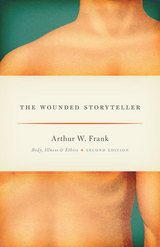
Drawing on the work of authors such as Oliver Sacks, Anatole Broyard, Norman Cousins, and Audre Lorde, as well as from people he met during the years he spent among different illness groups, Frank recounts a stirring collection of illness stories, ranging from the well-known—Gilda Radner's battle with ovarian cancer—to the private testimonials of people with cancer, chronic fatigue syndrome, and disabilities. Their stories are more than accounts of personal suffering: they abound with moral choices and point to a social ethic.
In this new edition Frank adds a preface describing the personal and cultural times when the first edition was written. His new afterword extends the book’s argument significantly, writing about storytelling and experience, other modes of illness narration, and a version of hope that is both realistic and aspirational. Reflecting on both his own life during the creation of the first edition and the conclusions of the book itself, Frank reminds us of the power of storytelling as way to understanding our own suffering.
READERS
Browse our collection.
PUBLISHERS
See BiblioVault's publisher services.
STUDENT SERVICES
Files for college accessibility offices.
UChicago Accessibility Resources
home | accessibility | search | about | contact us
BiblioVault ® 2001 - 2024
The University of Chicago Press





